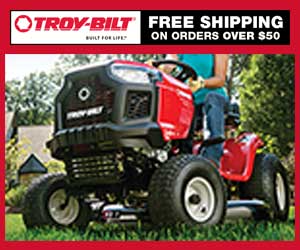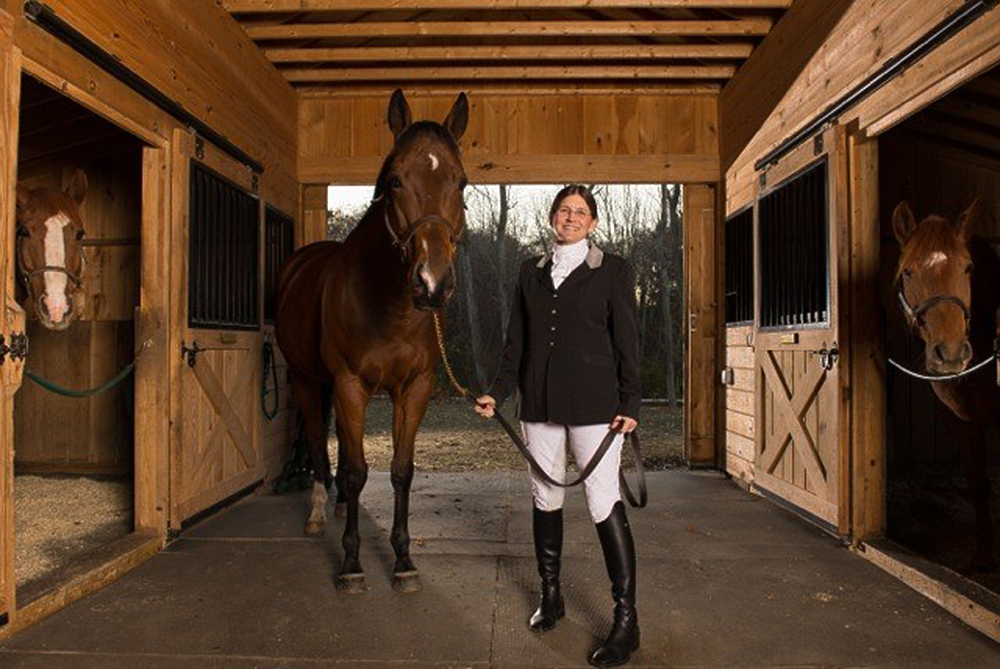
By Nikki Alvin-Smith
When I arrived in America from Great Britain eons ago, I was soon engrossed in everything horse. In fact, it only took me a few months to purchase my first USA horse and put him in livery. My first and only boarding barn experience was at Caumsett State Park Stables, Lloyds Harbor, NY, at the previous estate of Marshall Field, the American entrepreneur and founder of Marshall Field of the Chicago-based department stores.
While the majority of horses were stabled in the new forty stall metal structure with two long aisles with ten stalls set each side of a center space, the original brick built polo barn was home to a couple of Grand Prix showjumpers, and also the location for the only bathroom available, so trips to and from and through the grand building were a necessity.
These trips would have been much more enjoyable without having to negotiate the fierce Dobermans, named Angel and Lucifer, who the leaseholders of the property kept on the farm (at some point Lucifer attacked our poodle resulting in an expensive veterinary visit so that dog was aptly named).
Despite the dogs unwanted accompaniment of my visits, as I walked through these beautiful stables the center aisle design was obviously a superb idea.
The center aisle design was especially appreciated during our first American winter, when the weather surprised us with its tenacity and three feet of snow. Blissfully unaware of how difficult negotiating the drive to the barn would be, we knew once there we would find safe harbor from the weather in the center aisle barn to tack up before we headed to the indoor to ride.
En route to the barn we encountered the scary appearance of a huge bright yellow behemoth, a snowplow, which tore through the country road with little regard for where we were going to place our car to avoid a head on collision. It was quite a surprise to us, as England had no snowplows (even now I believe the country only has a handful).
So my introduction and appreciation for a center aisle barn was complete. The usefulness of the inside space for farrier work, clipping, grooming was apparent. I had never used crossties before and regarded them with some suspicion. Thankfully my horse McCloud knew all about them, and they were very useful.
In England my experience had been with shedrow and L-shaped horse yards. This new American center aisle barn was an interesting discovery. When we built our first barn on our first farm the following winter it was shedrow, mainly because this was the easiest and cheapest design that we could afford with our new mortgage.
Later we added more shedrows and L-shapes. Our final barn build on that farm was a center aisle. All our barns were hand built by just hubbie and myself and while we started with hammer and nails, by the final barn we had super tools and I could wield a nail gun and lay shingle.
Yes, we had succumbed to the center aisle design. Joy of joys! No more schlepping about in the snow and wind and rain. It was time to walk my one true love down the center aisle. I mean my horse of course. Did you think I meant hubbie. Don’t tell him.
There are lots of points to consider when you opt for a center aisle barn design. Here are a few tips to help you make a good marriage with your needs and your wants in a new barn build.
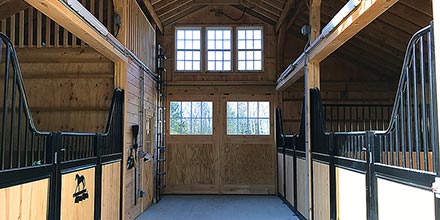
Width Matters
The width of the aisle affects safety. If you know you are going to have boarders with tack trunks, blanket rails etc. and general clutter then you’ll need more than the minimum of 10 feet. There should be room for two horses to safely pass each other especially in a busy barn environment.
Cross ties can be placed in the center of the aisle but if it is a busy space having at least one grooming stall on the side of the aisle is a great idea for handler and horse safety.
Widths of 12, 14 or 16 feet are common. Obviously with the larger widths a grooming stall is a necessity.
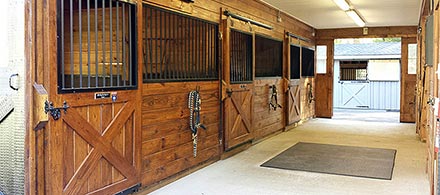
Door Safety
For safety all aisle stall doors should be sliding doors. Opening doors into the aisle is dangerous for both horse and handler. One good knock on the horse’s hip can cause permanent lameness. Always be certain the doors are a minimum of four foot wide and sliding if possible.
For added ventilation having Dutch doors that face the outside of the barn can be a great idea. Be cognizant of your anticipated horse’s size and ensure the bottom door is high enough to prevent the horse attempting to jump out (install a V-grill if necessary), and that all edges are protected by chewguards as most horses will chew when they are bored. Dutch doors also alleviate boredom for your equine partners as they can look about and enjoy the sights.
An overhang is also a great idea to keep poor weather out of the stall, and offer shelter from the sun.
The front wall and sliding doors should be grilled if you expect to have horses stabled and don’t want to run the risk of them attacking passer-by or other horses being led through the aisle, and especially if you have young or high strung horses that will rear and become excited when stalled.
Options such as feed grills are a great idea, as it saves going into the stall each day to feed. When planning your barn always compare apples to apples. These extra features can be expensive to add later, and a complete quote that encompasses all your needs and some of your wants and stays on budget but delivers just what you expected with a good warranty backing up the build is sincerely important.
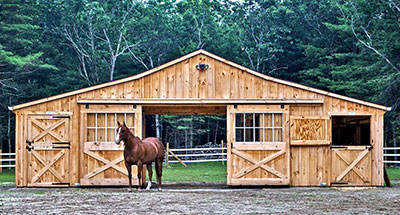
Barn Placement and Height
When placing the barn avoid having the aisle face the prevailing wind, as the ensuing wind tunnel will prove a challenge during winter months. The end doors can be solid for security or have tempered glass in the top portion to allow light into the building.
Height of the building should also be considered. Regardless of whether you opt for a stick built barn or a convenient modular build you want the barn to fit into the landscape. For example a high profile modular barn will offer the option of installing a loft space for storage above the stalls.
A low profile barn may better match the height of your existing dwelling on the property and is an extremely cost efficient method to enjoy the benefits of a center aisle barn.
Always be certain that the builder is cognizant of the snow load factor for your area and that the barn is properly engineered to handle what Mother Nature may bring to the equation. This is especially important if you live in an area where agricultural buildings are not subject to permits and no-one is checking the structure for competency.
Be aware that a low profile barn may have a roof pitch of 4/12 while a high profile build may be 8/12 pitch or more. The roofing material is as important as the pitch, because ice and snow will slide off a metal roof better than off a shingle roof. Of course, having a pile of snow just outside your building can pose snowmelt issues, so be certain you have installed drainage to take the melt away.
It always pays to consult a professional on these topics, and a good company will be happy to take the time to explain your options and to help you stay on budget with a properly engineered truss system.
Also in regard to roofing consider adding an insulation layer beneath the roof to help defray the heat and cold factor in the barn. An insulating layer will also prevent condensation dripping from a tin roof.
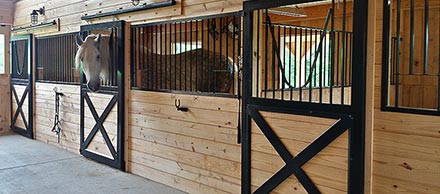
Light & Airy
Stall windows should be designed for ease of cleaning and have safety grills to protect the horses when stalled. Ideally the windows will have a screen and can be opened during hot summer months to enable a breeze to cool the barn.
Cupolas are perfect for adding an electric fan to draw hot air through the barn during summer months and to keep air moving. If you are installing stall fans be certain to use only commercial grade fans and keep them dust free to help prevent a fire hazard.
In conclusion the center aisle barn is a tremendously useful design, especially for areas where Mother Nature can be inclement. The cozy feel as you step out of the wind and into the barn and close that door behind you, greeted with the scents of everything horse and the contented munching of your equine beasties is priceless.
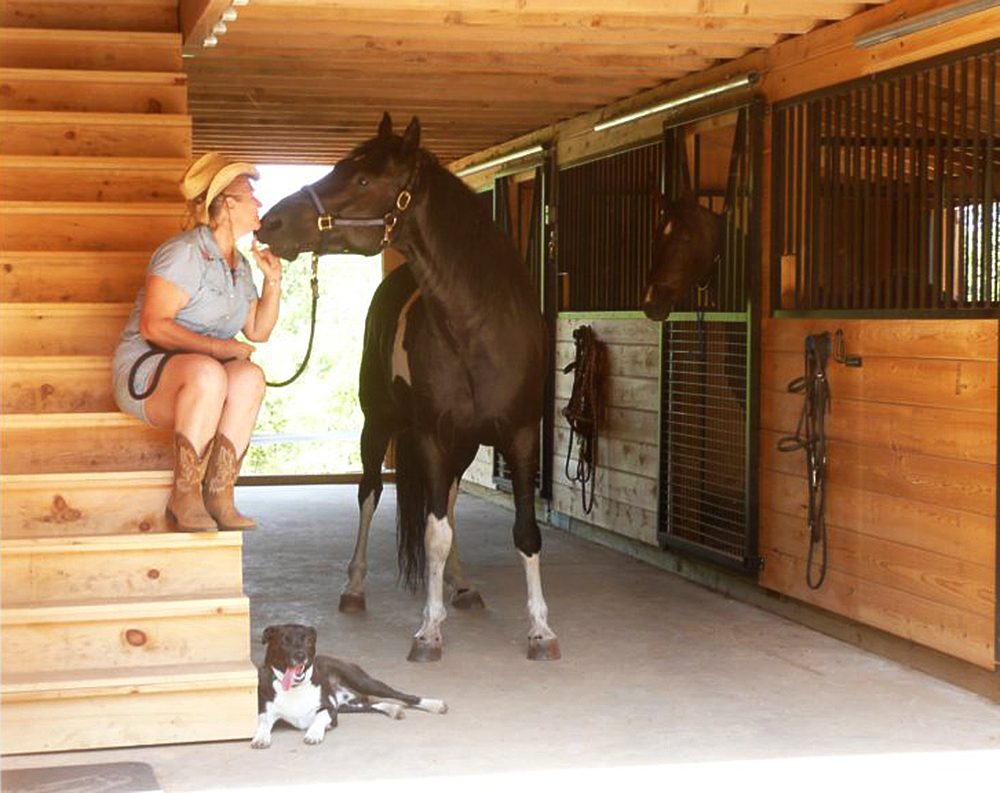
Yes. It’s true. While you may start out with one horse you’ll have more than one horse of course, once that barn is build. Don’t tell hubbie! Enjoy walking your multiple true loves down that center aisle everyday.
This article is brought to you courtesy of Horizon Structures Inc., Atglen PA – Modular horse barn and indoor riding arena specialists. Please visit https://www.HorizonStructures.com to learn more.
About Horizon Structures: One horse or twenty, there's one thing all horse owners have in common...the need to provide safe and secure shelter for their equine partners. At Horizon Structures, we combine expert craftsmanship, top-of-the-line materials and smart "horse-friendly" design to create a full line of sheds and barns that any horse owner can feel confident is the right choice for their horses' stabling needs.
All wood. Amish Made. Most of our buildings are shipped 100% pre-built and ready for same-day use. Larger barns are a modular construction and can be ready for your horses in less than a week. All our barn packages include everything you need.
Horizon Structures also sells indoor riding arenas, chicken coops, dog kennels, 1 and 2 car garages, storage sheds and outdoor living structures.
Headquartered in South-Central Pennsylvania, Horizon Structures, LLC is owned by Dave Zook. Dave was raised in the Amish tradition and grew up working in the family-owned shed business. He started Horizon Structures in 2001 in response to an ever-increasing customer demand for high quality, affordable horse barns.
For additional information about the company or their product line, please visit their website at www.horizonstructures.com
About Nikki Alvin-Smith: International and national published freelance writer and photographer in such world renowned publications such as The Chronicle of the Horse, Horse and Hound, Dressage and CT, The Horseman’s Yankee Pedlar, The Equine Journal, Spur, Hoofprint, Horsin’ Around, Horses All, Field & Stream, Horse Bits, Pony Quarterly, Catskill Horse to name a few.
Ghostwriting, blog services, PR/Marketing copy either direct with manufacturer or for agencies, copy editing and editor services also available. Nikki has produced catalog copy, corporate brochures and advertising copy for international corporations and PR/Marketing for celebrities.
As a Brit who has called the America home for the past 34 years, Nikki brings a unique perspective to the equestrian world. Nikki is also an accomplished Grand Prix dressage trainer/competitor, competing at international Grand Prix level to scores over 72% and is a highly sought clinician offering clinics worldwide.
She has been a horse breeder/importer of warmblood and Baroque breeds for more than 25 years. Together with her husband Paul who is also a Grand Prix trainer, they run a private dressage breeding operation and training yard in the beautiful Catskill Mountains of New York. Please visit www.NikkiAlvinSmithStudio.com to learn more.
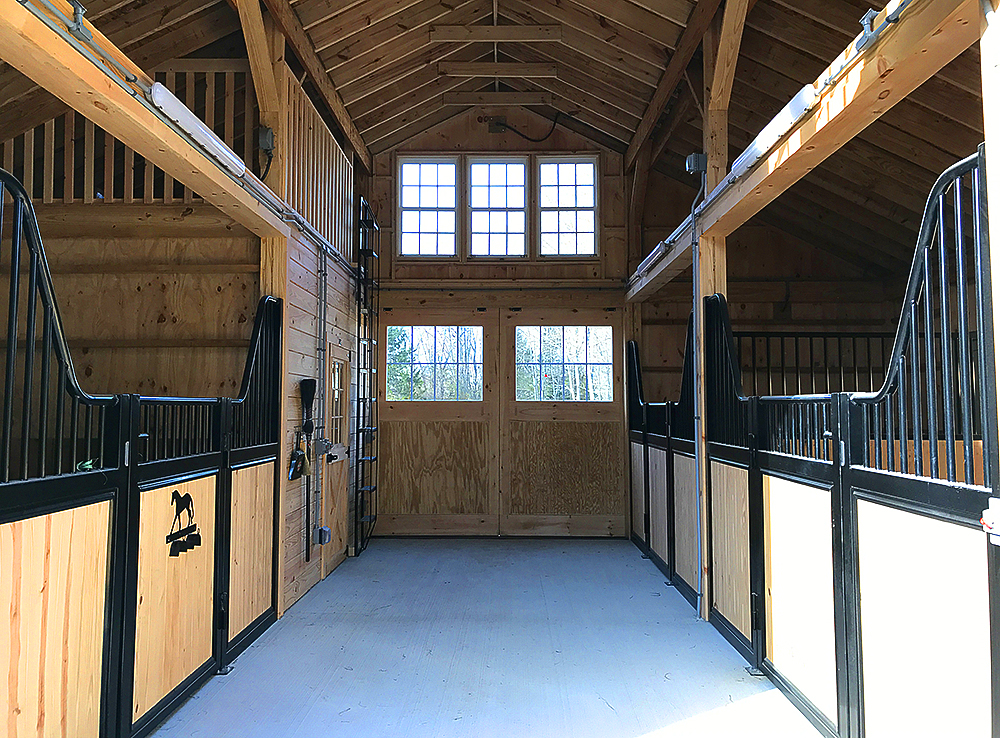
There are more interesting articles in our section on Tack & Farm.
Are you interested in promoting your business or sharing content on EIE? Contact us at info@equineinfoexchange.com






